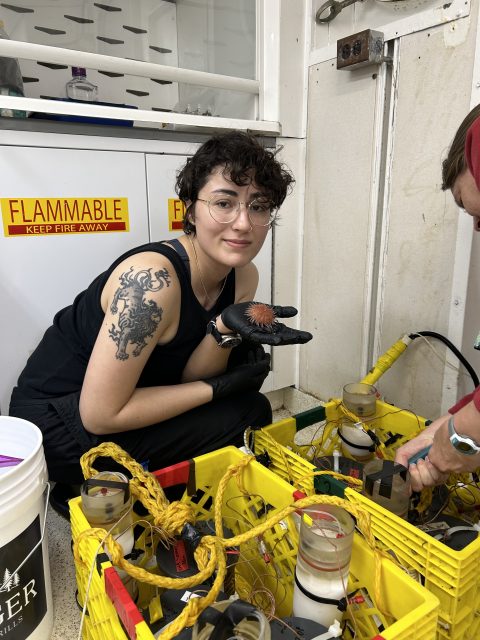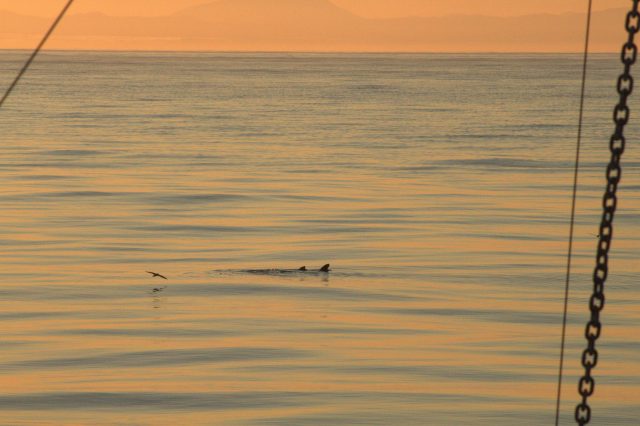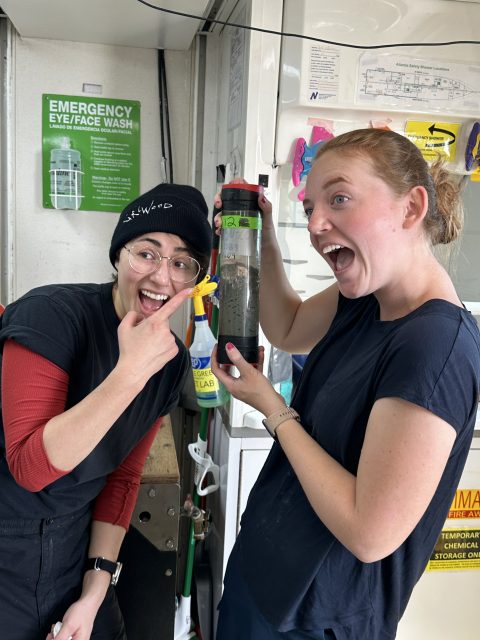Life at Sea: Student Reflections from the VISIONS’24 (Leg 2) Expedition
As part of the Regional Cabled Array operations and maintenance 2024 cruise, a cohort of 24 undergraduates spanning different countries of origin, states, and socio-economic backgrounds, participated in the expedition as part of the UW at-sea experiential learning program called VISIONS. This program has allowed over 200 undergraduate students, studying myriad disciplines, the opportunity to spend 8-45 days at sea on NSF-funded global class research ships utilizing state-of-the art remotely operated vehicles (ROV). Onboard, they stand 4-hr on, 8-hr off watches in the ROV control room working alongside the pilots, and RCA engineers and scientists. They work out on deck, learn about ship operations, and gain skills in oceanographic sampling and analyses of fluids. They see first-hand life forms rarely seen thriving in some of the most biologically productive waters in the ocean along the Cascadia Margin, the abyss at 2900 m water depth, and on 350°C underwater hot springs at the summit of Axial Seamount – the most active underwater volcano off the Oregon coast. The interviews below provide a glimpse of VISIONS’24 student impressions of life at sea and their experiences onboard. For many, their lives are forever changed.
The cohort included students like Leo Couchon, whose passion for ocean sciences and hands-on learning brought a unique perspective to the expedition. Leo embraced the challenges and opportunities of life at sea, immersing themselves in the demanding yet rewarding work environment. Their reflections offer a window into how the VISIONS program not only provides technical skills but also fosters personal growth and a deeper connection to the oceanographic community.
What motivated you to join the VISIONS program?
I really look up to Deb as a pioneer in Ocean Sciences and was really excited about the opportunity of learning about all different types of life on a research vessel. I wanted more than anything in the world to get my sea legs. It’s difficult to get your first experience at sea/days at sea, but it’s vital for oceanographic and marine technician work.
What skills did you develop or strengthen during your time at sea that you feel will be valuable in your future career?
Over the course of the VISIONS program, I had numerous opportunities to learn new skills and techniques. I learned how to perform meticulous, detail-oriented data logging in the ROV control van, how to deploy a CTD with Niskin bottles, and sediment push core sampling techniques. In some cases, the actual skills I was learning were second to who I was learning it from. I got the chance to learn about microbial mats and sediment cores directly from Dr. Laura Lapham, and I had the opportunity to learn Oceanographic field techniques from the people who developed the equipment we were using! I also feel like I learned things that helped me develop my communication skills in this kind of unique work environment. Between the strenuous work schedule and the round-the-clock nature of the crew and science team’s activities, I began to realize how interdependent and involved different departments need to be. Being able to effectively communicate within this was so important to my takeaway from this experience – everyone has something important to offer in terms of insight, even other students, and being able to navigate that interdependence and make a point to talk to everybody on the boat did a lot to enrich my experience.
How do you see the skills and experiences gained from the seagoing and Ocean 411 class, contributing to your role in the future workforce, particularly in science and engineering fields?
It was inspiring to be surrounded by professionals in the field I want to spend my life in; having that sense of responsibility and dedication is intoxicating. It’s something that I’ll bring with me to every future position I hold. I want to do meaningful science that involves the communities that I work within, and I want to learn enough that I can teach people. I loved being connected to everyone on the boat, getting to hear people’s stories and personal connections are important for science communication. There are still so many people out there that don’t even know what oceanography is as a field let alone how all of the pieces of the puzzle fit together. I am so genuinely excited to share my experience with anyone that will listen. I think that the skills I learned during VISIONS will be incredibly important to my future career in research, but moreover I believe that this experience increased my capacity to be effective in science communication.
What advice would you give to other students considering applying for experiential learning programs like VISIONS?
You can only get as much from the program as you put in, so apply yourself to everything that comes your way because you’ll never know what you can get from it. It’s difficult to put yourself out there but it’s worth it. Saying yes to everything that comes your way and always being willing to help everyone during the program is vital in learning a variety of skills. That said I also recommend advocating for your needs and ensuring you not to overload yourself. Carving out time for yourself to rest, reflect, and enjoy the experience for what it is can be equally important.
What was the most surprising thing you experienced during your time at sea?
There are so many people on the boat in one space and everyone is working 24/7, there’s always someone in the middle of their sleep while someone is in the middle of their shift and there is always something to learn – but it’s also routine. You just melt into the way that the boat operates. It’s the little moments that would catch me off guard. There was a night at around 2am where I left the darkness of the control van lit only by the ROV’s camera at around 2000 meters deep to be met with the expanse of the sky reflecting the end of the Perseids meteor shower. Or a day when I fully bawled on deck after everyone rushed out to see a dolphin pod following and I caught a glimpse of my favorite fish that I never thought I would get to see in person, the Mola mola. There is a sense of magic that’s difficult to put into words. You can’t ever quite carve out a moment of silence or time alone but you’re experiencing everything aboard with everyone. It’s both connecting and isolating all at once, the things that make it difficult are the very same things that make it beautiful.
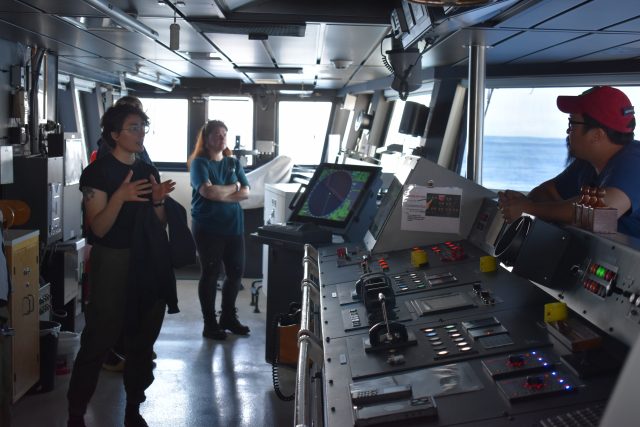
Bridge tour. (c) Kellen Rosburg
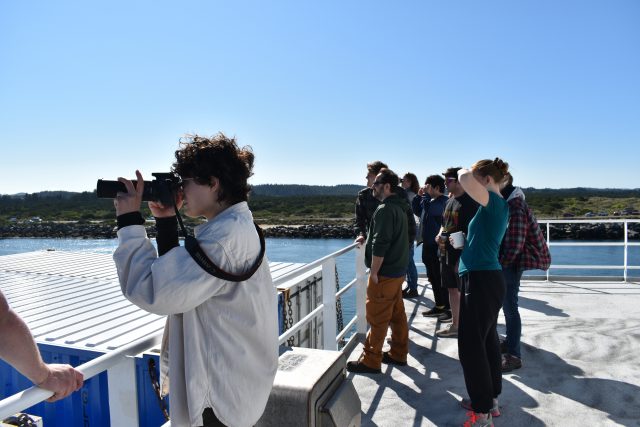
End of Leg 2. (c) Mitch Elend
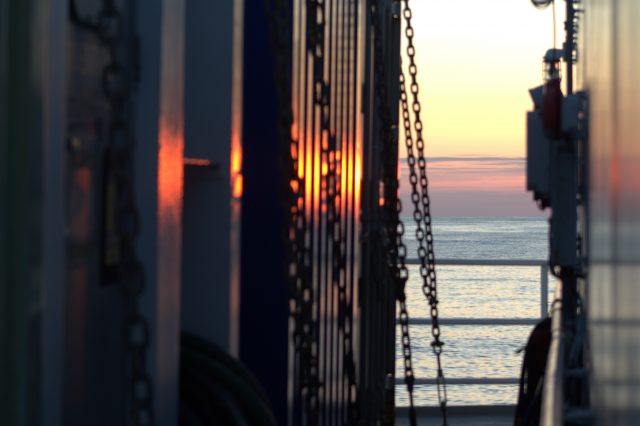
Sunrise on deck. (c) Leo Couchon

